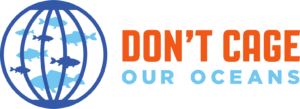Press Release
For Immediate Release: March 18, 2024
Contact:
Casey Willson, cwillson@dontcageouroceans.com, 301-332-1202 (text/call)
Feini Yin, feini@namanet.org, 908-745-9768 (text/call)
Fishermen, farmers, chefs, and ocean advocates in DC to raise alarm about factory fish farming in federal waters
Coalition members will meet with policymakers to encourage investments in working waterfronts and to oppose legislation aimed at opening US waters to industrial fish farms.
Washington, D.C. — A coalition of fishermen, farmers, chefs, and environmental advocates is assembling on Capitol Hill from March 19 to 21 to caution against the development of offshore fish farming in U.S. federal waters. The group warns that offshore fish farming would further entrench an industrialized food system that rewards large corporations, while disenfranchising independent and heritage food producers that make up the fabric of coastal communities.
“There has been a big push to open U.S. waters to industrial fish farming, under the guise of ‘feeding the country,’” said Andrianna Natsoulas, campaign director of Don’t Cage Our Oceans, the advocacy organization bringing the coalition together. “That argument doesn’t hold water for so many reasons.”
According to Natsoulas, the U.S. already lands nearly enough seafood to meet the country’s demands. Furthermore, aquaculture operations often produce less protein in the form of farmed fish than they extract from the ocean in the form of wild fish used for fish feeds. One study found that the amount of wild fish used by Norwegian salmon farms in 2020 alone could feed up to 4 million people in West Africa. Another estimated that about half of the 1.1 to 2.2 trillion wild fishes caught globally each year are transformed into fishmeal and fish oil.
The group in D.C. includes people from 14 states, including constituents from Alaska, the Pacific Northwest, California, the Gulf of Mexico, the Mid and South Atlantic, and New England. Coalition members have several legislative demands. They are urging congressional offices to oppose the AQUAA Act and the SEAfood Act, two pieces of policy they say would put our national waters and coastal communities at risk if passed.
“Policies like the AQUAA Act and the SEAfood Act would open the door to offshore aquaculture operations that release chemicals, diseases, and untreated waste into the open ocean — not to mention mass escapements of farmed fish that pose serious threats to wild fish populations,” said James Mitchell, legislative director for Don’t Cage Our Oceans. “When it comes to a public resource as precious as our oceans, we should be employing the precautionary principle. Instead of charging ahead, let’s study the offshore fish farms that already exist around the world. And let’s continue supporting the fishing businesses and methods that we know are safe and sustainable.”
The group is also advocating for the passage of the Improving ARCTIC Act, introduced by Senator Murkowski of Alaska in July of 2023, which they say will help to improve the livelihoods of small- and medium-scale fishermen, while improving the competitiveness of US seafood.
Chef Colette Nelson, one of the coalition members in D.C. this week, spent three seasons salmon fishing in the Gulf of Alaska before serving for two decades as executive chef and owner of Ludvig’s Bistro, a seafood restaurant in Sitka, AK. “Having witnessed the disastrous unfolding of salmon farming in the Pacific Northwest, I have firsthand knowledge of how destructive these operations can be,” she said. “As a chef, I care about serving people quality, sustainable seafood. That’s why I’m in D.C. this week, urging our officials to not be irresponsible with our oceans’ health and wildlife.”
“What we want to see are more values-based, local and regional seafood systems led by people from coastal communities. That could include aquaculture, but only if it’s low-impact, it’s appropriately-scaled, and it feeds back into the community,” said Jason Jarvis, another coalition member in D.C. this week. Jarvis is a small-scale fisherman in Rhode Island who is part of an effort to open a fishermen’s cooperative called Quonochontaug Fish Company later this year.
“Models like locally-owned co-ops keep our nation’s working waterfronts alive. Meanwhile, industrial fish farms line the pockets of corporate execs hundreds of miles away,” said Jarvis, who also serves as board president of the North American Marine Alliance, a fishermen-led organization aimed at building a broad movement for healthy oceans and thriving fishing communities. Earlier this year, the alliance released an “Aquaculture Values Report” that aimed to outline characteristics of sustainable, equitable, and values-based aquaculture endeavors.
###
Don’t Cage Our Oceans is a coalition of diverse organizations working together to stop the development of offshore finfish farming in the United States through federal law, policies, and coalition building. DCO2 uplifts values-based seafood systems led by local communities.
